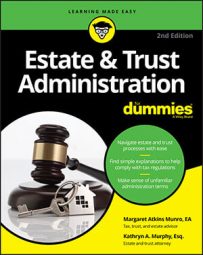When you’re trying to figure out exactly how much the estate owns, you may be tempted to liquidate everything into cash. Although this thinking may work sometimes, don’t do it with any pension plan, IRA, or deferred compensation plan if you can avoid it. As soon as you cash out that plan, the estate now owes income taxes on every penny that the decedent hadn’t already paid tax on.
In addition to the income tax bite, if you’re dealing with a large enough estate, you may also owe federal and/or state estate taxes on the value of the account as of the date of death. Talk about double taxation. Between the income and estate taxes paid, the effective tax rate on a large IRA can be about 97 percent.
Rolling the income-tax-deferred account to the heirs, if you can, is far better than taking a lump sum distribution in the estate. If the decedent left a surviving spouse or children, and the decedent (or the plan itself) designated them as beneficiaries, you have no problem.
Using the rollover technique, no one owes any income taxes until the new beneficiaries begin to take distributions; additionally, you can spread those distributions out over a number of years, lessening the tax bracket each distribution is taxed at. Of course, if you have a taxable estate, the value of the account at the date of death is still included for estate tax purposes.
Seek competent tax advice as soon as you discover a large IRA because there are time limits imposed on retitling it. If the asset in question is a pension, check the plan documents to determine what options are available to the beneficiary.
And if your decedent was deferring a portion of his or her income into a non-qualified deferred compensation plan, oh well. The full plan balance is due and payable upon the decedent’s death, and will be included in both income and estate tax calculations.

